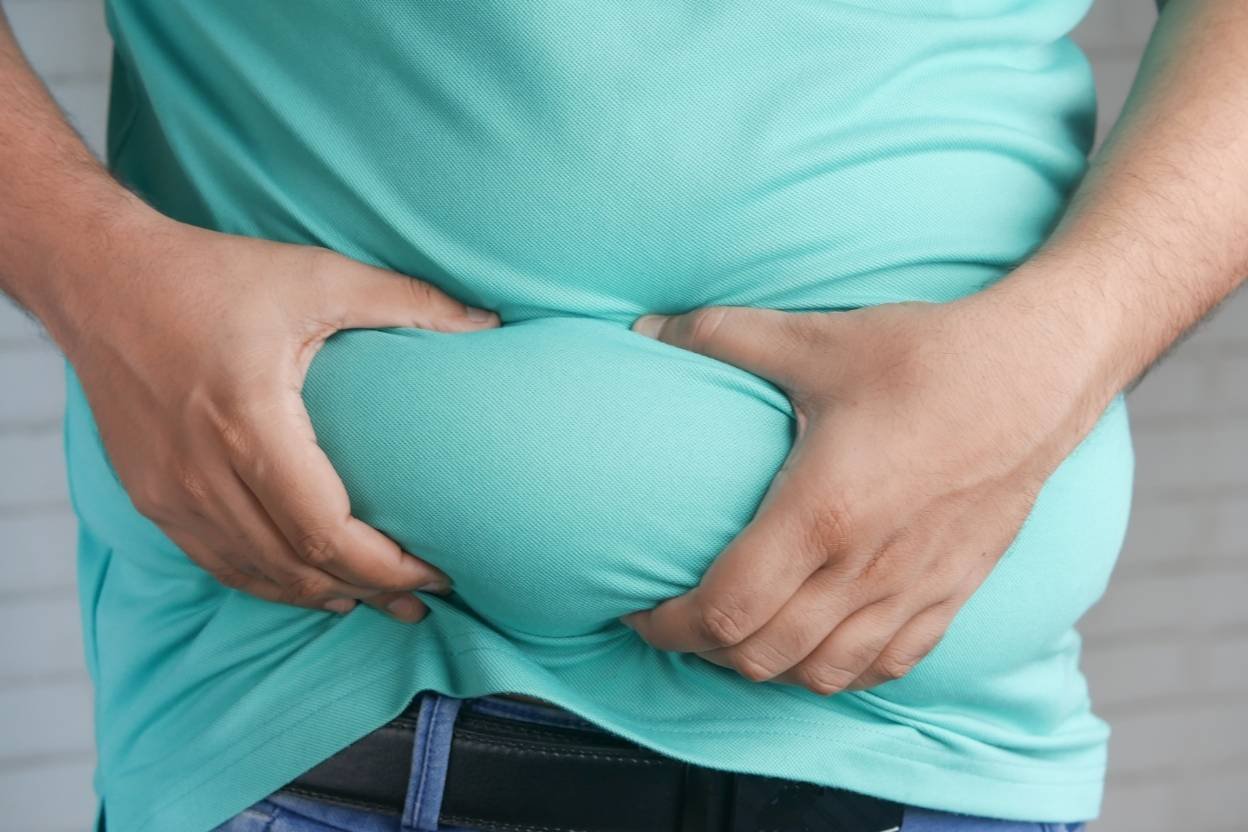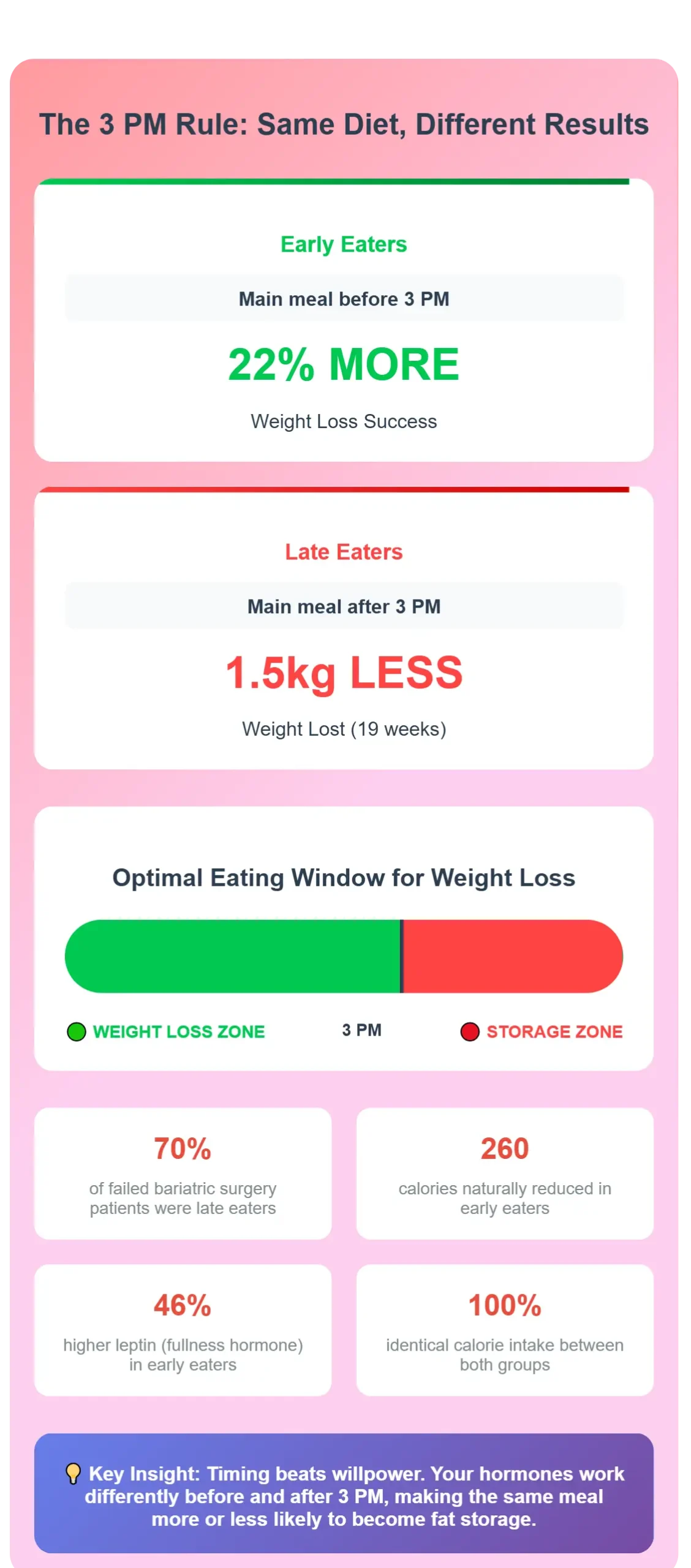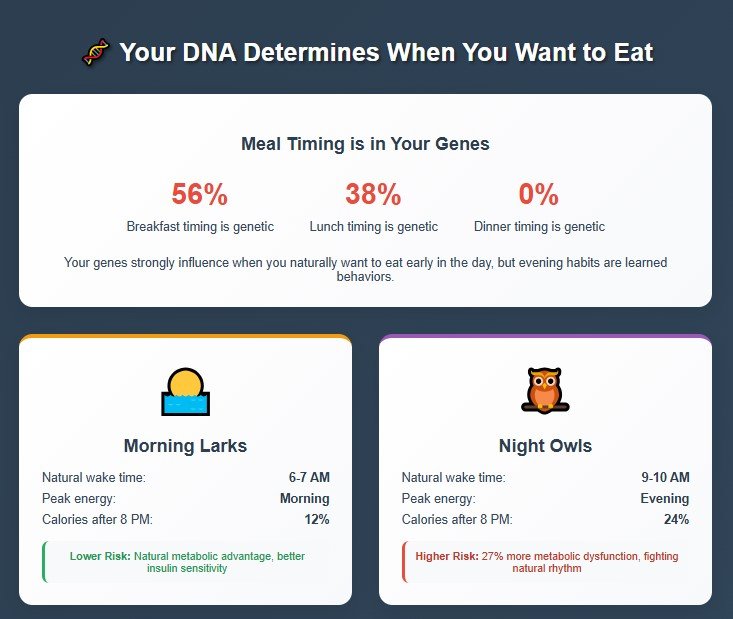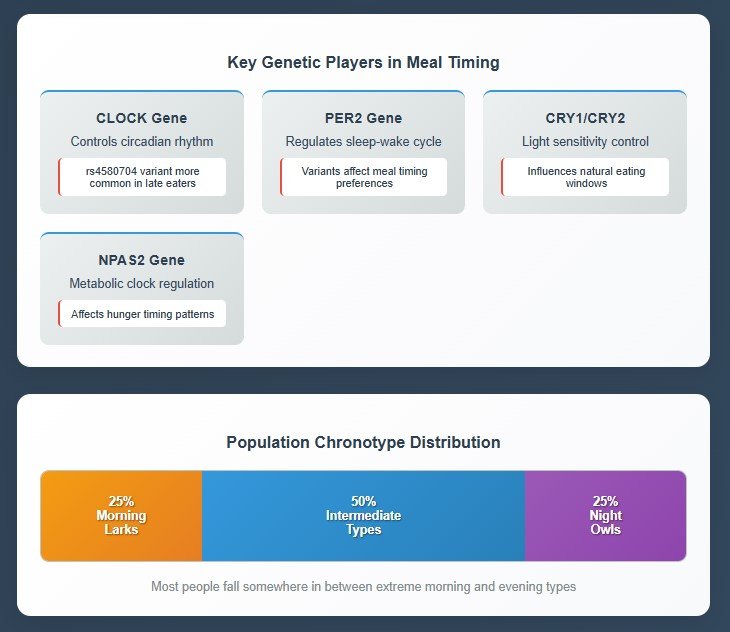
You’ve been counting calories, measuring portions, and religiously tracking macros. But what if I told you that when you eat that apple might matter more than the apple itself?
I know, I know. It sounds too simple to be true. But here’s the thing—scientists have been quietly uncovering something that completely flips everything we thought we knew about weight loss on its head.
Your body literally processes the exact same meal differently depending on what time you eat it. That 500-calorie breakfast? Your body handles it like a metabolic superhero. That same meal at 9 PM? Suddenly, your metabolism turns into a sluggish storage unit.
After digging through dozens of recent studies (and trust me, there were a lot of big words involved), researchers have reached a pretty mind-blowing consensus: meal timing might be just as important as calories for weight loss success.
Here’s Why Your Internal Clock is Sabotaging Your Diet
Your Body’s 24-Hour Metabolic Efficiency Clock
Remember when your mom used to say “early to bed, early to rise”? Turns out, she was onto something way bigger than just good sleeping habits.
Your body runs on what scientists call circadian rhythms—basically, you’ve got internal clocks ticking away in every single organ. Your liver has a schedule. Your pancreas has a schedule. Heck, even your fat cells have a schedule.
Here’s where it gets crazy: Your insulin sensitivity drops by 17% from morning to evening. Translation? That slice of toast you eat at breakfast gets processed like a normal, healthy person. That same slice at dinner? Your body reacts like you’re basically pre-diabetic.
Dr. Satchin Panda from the Salk Institute (the guy who basically started this whole time-restricted eating thing) puts it perfectly: “Every single organ, every single cell, has its own daily timed circadian rhythms.”
Think of it like this—your body expects breakfast because that’s when your digestive team is fully staffed and ready to work. By evening, half the crew has gone home, and the skeleton staff that’s left just isn’t as efficient.
The Spanish Discovery That Changes Everything

Want to hear something that’ll make you rethink your lunch schedule forever?
Spanish researchers followed hundreds of dieters and discovered something remarkable: people who ate their main meal before 3 PM lost 22% more weight than those who ate later. Same calories. Same diet. Same everything—except timing.
The late lunch crowd lost 1.5 kilograms less over 19 weeks. And here’s the kicker—they weren’t cheating or eating more. They were doing everything “right” according to traditional diet advice.
Even more shocking? When they looked at people who’d had bariatric surgery (where your stomach is literally made smaller), 70% of the patients who struggled to lose weight were late eaters. Your meal timing affects weight loss even when your stomach is surgically shrunk!
The reason comes down to leptin—your body’s “I’m full” hormone. Early eaters kept their hunger hormones humming along nicely all day. Late eaters? Their hormones went haywire, creating this vicious cycle where late eating led to more cravings, which led to more late eating.
Why Intermittent Fasting Actually Works (And It’s Not What You Think)
Let’s talk about intermittent fasting for a hot minute. You’ve probably seen it everywhere—from your coworker who swears by it to that fitness influencer on Instagram.
Here’s the real deal: systematic reviews show it can lead to 0.8-13% weight loss. But not all approaches work the same.
Alternate Day Fasting (eating normally one day, very little the next) showed the most dramatic results—up to 12.97% weight loss. The popular 16:8 method (eating within 8 hours, fasting for 16) produced 3-8% weight loss.
Dr. Krista Varady from the University of Illinois has studied this stuff for years. Her take? “Intermittent fasting is essentially just narrowing down, cutting out about six hours of eating per day.”
Most of us naturally eat for about 14 hours a day. When you shrink that to 8 hours, you’re basically cutting out those late-night snack attacks. Simple, right?
The sweet spot seems to be 16:8. In head-to-head studies, it beat the 14:10 approach. But here’s what’s interesting—going more extreme doesn’t always help. Four-hour eating windows worked just as well as eight-hour windows, but way more people quit.
The lesson? Sustainability beats perfection every single time.
The Breakfast Myth That’s Been Lying to You
Brace yourself for this one: “Breakfast is the most important meal of the day” started as a marketing slogan. General Mills came up with it in 1944 to sell cereal. Not exactly the scientific foundation we’d hope for, right?
Modern research tells a different story. When scientists looked at 13 randomized controlled trials, they found that breakfast skippers actually weighed less (by about a pound) and naturally ate 260 fewer calories per day.
But wait—doesn’t every health article tell us breakfast eaters are thinner? Here’s the plot twist: breakfast skipping is often a sign of late-night eating. People who skip breakfast aren’t necessarily doing anything wrong with their morning routine—they’re usually eating too late at night.
Dr. Ruth Patterson from UC San Diego nails it: “When people talk about breakfast, what I often say is, when you’re talking to people who skip breakfast, I think skipping breakfast is actually a marker of eating at night.”
The real issue isn’t when you start eating—it’s consistency. People who eat breakfast at wildly different times (6 AM some days, 10 AM others) lose 6% less weight than those who stick to the same schedule.
The Breakfast Myth: Marketing vs. Science
How a Marketing Slogan Became “Scientific Truth”
🥣 The Marketing Myth
🔬 The Science Reality
Why Nighttime Eating is Your Metabolism’s Worst Enemy
Picture this: It’s 9 PM, you’re watching Netflix, and that bag of chips is calling your name. We’ve all been there.
But here’s what’s happening inside your body that you can’t see—you’re eating during your biological night, when your metabolism has basically clocked out for the day.
Americans now eat over 45% of their daily calories during evening meals and snacks. That’s a massive shift from how we used to eat, and it’s wreaking havoc on our waistlines.
Japanese studies found that late dinners increase your overweight risk by 46%, and bedtime snacks bump it up by 48%. Even more concerning—up to 25% of severely obese people struggle with night eating syndrome, creating this awful cycle where poor sleep drives late eating, which messes up sleep even more.
Think of it like this: when you eat late, you’re basically asking your night-shift security guard to do the day manager’s job. He’s just not equipped for it.
🌙 Your Hormones After Dark: Why Night Eating Backfires
Hormone Levels Throughout The Day
How American Eating Patterns Have Shifted
🔄 The Vicious Night Eating Cycle
Your body releases melatonin at night (the sleepy hormone), and when food shows up during melatonin time, your glucose metabolism goes completely off the rails. Healthy people start responding to food like they’re diabetic.
Your Genes Might Be Working Against You (But It’s Not Hopeless)

Here’s something that might make you feel better about your eating struggles—your breakfast timing is 56% genetic. If you’re not naturally a morning eater, you’re literally fighting your DNA.
Evening people (night owls) face a 27% higher risk of metabolic problems and eat twice as many calories after 8 PM compared to morning larks. But here’s the thing—forcing yourself to eat early might not be the answer.

The CLOCK gene variant rs4580704 is way more common in late eaters. Some people are just wired to prefer eating later. This doesn’t doom you to weight gain, but it does mean you might need different strategies.
If you’re naturally a night owl, trying to force yourself into a 6 AM breakfast routine might be setting yourself up for failure. Instead, focus on eating consistently within your natural rhythm and avoiding those really late meals.
What This Means for Your Real Life
Okay, so now you know the science. But how do you actually use this stuff without turning your life upside down?
Start with consistency before perfection. Pick meal times and stick to them within a 1-2 hour window. This matters more than hitting some “perfect” time. People with irregular meal timing lose 6% less weight, regardless of when they actually eat.
Try “front-loading” your calories. Aim to eat 40-50% of your daily calories before 2 PM. You don’t have to skip dinner—just make breakfast and lunch heartier and keep dinner lighter.
Work with your natural rhythm, not against it. Morning people might thrive with an 8 AM-4 PM eating window. Night owls might do better with 12 PM-8 PM. The key is finding what you can actually stick to.
Make changes gradually. Shift your meal times by 15-30 minutes each week instead of going cold turkey. Research shows this approach has way better success rates.
🎯 Your Meal Timing Action Plan
Your 4-Week Implementation Plan
Choose Your Optimal Eating Window
📊 Track These Success Indicators
🚀 Quick Wins You Can Start Today
The Bottom Line That Changes Everything
Here’s the truth that diet culture doesn’t want you to know: when you eat might be just as important as what you eat.
This isn’t about perfect timing or following some rigid schedule that makes your life miserable. It’s about understanding that your body has natural rhythms, and when you work with them instead of against them, weight loss becomes so much easier.
The same meal literally becomes more or less fattening depending on when you eat it. A 500-calorie breakfast burns about 75 calories just through digestion. That same meal at dinner? Only 50 calories.
Your body isn’t broken. Your willpower isn’t weak. You’ve just been working against your biology instead of with it.
The future of weight loss isn’t about discovering new foods to avoid—it’s about rediscovering the right timing for the foods we already eat.
So tomorrow morning, try eating a bigger breakfast. Have a substantial lunch before 3 PM. Keep dinner light and early. Your circadian rhythms will thank you, and your scale might just start moving in the right direction.
Ready to give it a try? Start with just one change this week—maybe shifting dinner an hour earlier or making breakfast a bit more substantial. Small changes, big results. That’s how real transformation happens.






